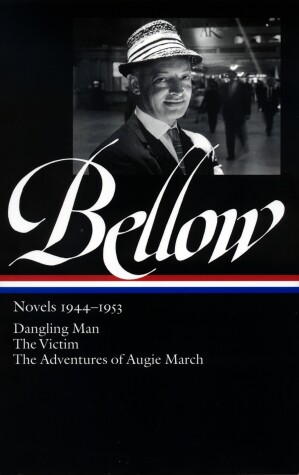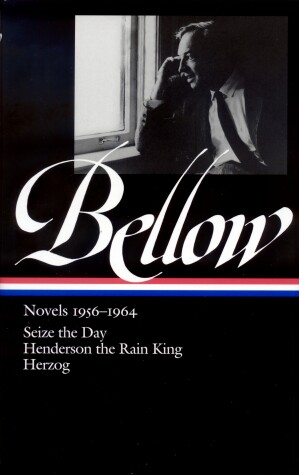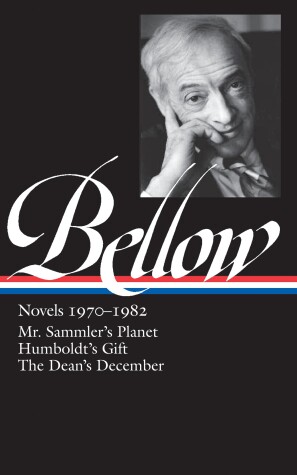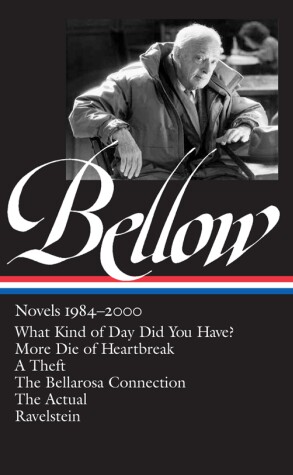Library of America Saul Bellow Edition
4 primary works
Book 1
Winner of the Nobel Prize and a towering figure of twentieth-century literature, Saul Bellow secured his place as one of the most distinctive and significant writers of the postwar era with the publication of his third novel, The Adventures of Augie March. This Library of America volume collects all three of Bellow’s early works, beginning with Dangling Man (1944), an incisive character study cast in the form of a diary that depicts the anguish and uncertainty of a man known only as Joseph. Expecting to be deployed to the war overseas, Joseph quits his job and finds himself increasingly on edge when his draft board defers his enlistment. The first of his many books to take place in Chicago, Dangling Man is a spare, haunting novel in which Bellow lays bare Joseph’s dilemma with rigorous precision and subtlety.
The Victim (1947), which Bellow described as “a novel whose theme is guilt,” is an unsettling moral parable. Left alone in New York City while his wife is visiting her family, Asa Leventhal is confronted by a former co-worker whom he can barely remember. What seems like a chance encounter evolves into an uncanny bond that threatens to ruin Leventhal’s life. As their relationship grows ever more volatile, Bellow stages a searching exploration of our obligations toward others.
In a radical change of direction, Bellow next wrote The Adventures of Augie March (1953). Its eponymous hero grows up in a bustling Chicago peopled by characters as large as vital as the city itself, then sets off on travels that lead him through the byways of love and the disappointments of a fast-vanishing youth. Exuberant, uninhibited, jazzy, infused with Yiddishisms and a panoply of Depression-era voices, Augie March is borne aloft by an ebullient sense of irony. Winner of the 1954 National Book Award and praised by writers and critics ranging from Alfred Kazin to Salman Rushdie and Martin Amis, The Adventures of Augie March has had a lasting impact that shows no sign of abating.
LIBRARY OF AMERICA is an independent nonprofit cultural organization founded in 1979 to preserve our nation’s literary heritage by publishing, and keeping permanently in print, America’s best and most significant writing. The Library of America series includes more than 300 volumes to date, authoritative editions that average 1,000 pages in length, feature cloth covers, sewn bindings, and ribbon markers, and are printed on premium acid-free paper that will last for centuries.
The Victim (1947), which Bellow described as “a novel whose theme is guilt,” is an unsettling moral parable. Left alone in New York City while his wife is visiting her family, Asa Leventhal is confronted by a former co-worker whom he can barely remember. What seems like a chance encounter evolves into an uncanny bond that threatens to ruin Leventhal’s life. As their relationship grows ever more volatile, Bellow stages a searching exploration of our obligations toward others.
In a radical change of direction, Bellow next wrote The Adventures of Augie March (1953). Its eponymous hero grows up in a bustling Chicago peopled by characters as large as vital as the city itself, then sets off on travels that lead him through the byways of love and the disappointments of a fast-vanishing youth. Exuberant, uninhibited, jazzy, infused with Yiddishisms and a panoply of Depression-era voices, Augie March is borne aloft by an ebullient sense of irony. Winner of the 1954 National Book Award and praised by writers and critics ranging from Alfred Kazin to Salman Rushdie and Martin Amis, The Adventures of Augie March has had a lasting impact that shows no sign of abating.
LIBRARY OF AMERICA is an independent nonprofit cultural organization founded in 1979 to preserve our nation’s literary heritage by publishing, and keeping permanently in print, America’s best and most significant writing. The Library of America series includes more than 300 volumes to date, authoritative editions that average 1,000 pages in length, feature cloth covers, sewn bindings, and ribbon markers, and are printed on premium acid-free paper that will last for centuries.
Book 2
Passionate, insightful, often funny, and exhibiting a linguistic richness few writers have equaled, the novels of Saul Bellow are among the defining achievements of postwar American literature. The Library of America volume Novels 1956–1964 opens with Seize the Day, a tightly wrought novella that, unfolding over the course of a single devastating day, explores the desperate predicament of the failed actor and salesman Tommy Wilhelm. The austere psychological portraiture of Seize the Day is followed by an altogether different book, Henderson the Rain King, the ebullient tale of the irresistible eccentric Eugene Henderson, best characterized by his primal mantra “I want! I want!” Beneath the novel’s comic surface lies an affecting parable of one man’s quest to know himself and come to terms with morality; like Don Quixote, Henderson is, as Bellow later described him, “an absurd seeker of high qualities.”
Henderson’s irrepressible vitality is matched by that of Moses Herzog, the eponymous hero of Bellow’s best-selling 1964 novel. His wife having abandoned him for his best friend, Herzog is on the verge of mental collapse and has embarked on a furious letter-writing campaign as an outlet for his all-consuming rage. Bellow’s bravura performance in Herzog launched a new phase of his career, as literary acclaim was now joined by a receptive mass audience in America.
LIBRARY OF AMERICA is an independent nonprofit cultural organization founded in 1979 to preserve our nation’s literary heritage by publishing, and keeping permanently in print, America’s best and most significant writing. The Library of America series includes more than 300 volumes to date, authoritative editions that average 1,000 pages in length, feature cloth covers, sewn bindings, and ribbon markers, and are printed on premium acid-free paper that will last for centuries.
Henderson’s irrepressible vitality is matched by that of Moses Herzog, the eponymous hero of Bellow’s best-selling 1964 novel. His wife having abandoned him for his best friend, Herzog is on the verge of mental collapse and has embarked on a furious letter-writing campaign as an outlet for his all-consuming rage. Bellow’s bravura performance in Herzog launched a new phase of his career, as literary acclaim was now joined by a receptive mass audience in America.
LIBRARY OF AMERICA is an independent nonprofit cultural organization founded in 1979 to preserve our nation’s literary heritage by publishing, and keeping permanently in print, America’s best and most significant writing. The Library of America series includes more than 300 volumes to date, authoritative editions that average 1,000 pages in length, feature cloth covers, sewn bindings, and ribbon markers, and are printed on premium acid-free paper that will last for centuries.
Book 3
The third volume of The Library of America edition of Saul Bellow’s complete novels collects three essential works: Mr. Sammler’s Planet (1970), Humboldt’s Gift (1975), and The Dean’s December (1982). These novels, written in the period of Bellow’s greatest literary and popular acclaim—he was awarded the Nobel Prize in Literature in 1976—are unsparing yet humane, and range widely in their philosophical and cultural concerns. They offer the indispensable voice of a great American raconteur and thinker.
In Mr. Sammler’s Planet, the anarchic forces of late-1960s America are set loose on Artur Sammler, a highly cultured septuagenarian and European émigré who seeks “with God, to be free from the bondage of the ordinary and the finite.” A Holocaust survivor living out his latter days in Manhattan, Sammler endures the city’s everyday barbarism, as shocking as it is casual, and must contend with absurd complications when a manuscript goes missing.
Humboldt’s Gift depicts the deep and troubled friendship between the tormented poet Von Humboldt Fleisher and the renowned writer Charlie Citrine. Humboldt has died in squalid obscurity, but for Citrine the memory of their earlier days persists as counterpoint to a middle age studded with difficulties: a messy divorce, a demanding mistress, and the attentions of a Chicago hoodlum who claims that Charlie has cheated him. Writing of the book’s “rich and suggestive” narrative voice, Sven Birkerts observes, “There is a feeling when reading this novel that a tightly rolled sultan’s carpet has splashed open before our eyes.”
In The Dean’s December, Albert Corde experiences totalitarianism firsthand when he travels to Bucharest to visit his dying mother-in-law. As a college dean in Chicago he has attracted controversy through his journalism and his role in a racially charged murder trial. Alternating between Romanian and American settings, the novel is a profound indictment of official hypocrisy and corruption on both sides of the Iron Curtain.
LIBRARY OF AMERICA is an independent nonprofit cultural organization founded in 1979 to preserve our nation’s literary heritage by publishing, and keeping permanently in print, America’s best and most significant writing. The Library of America series includes more than 300 volumes to date, authoritative editions that average 1,000 pages in length, feature cloth covers, sewn bindings, and ribbon markers, and are printed on premium acid-free paper that will last for centuries.
In Mr. Sammler’s Planet, the anarchic forces of late-1960s America are set loose on Artur Sammler, a highly cultured septuagenarian and European émigré who seeks “with God, to be free from the bondage of the ordinary and the finite.” A Holocaust survivor living out his latter days in Manhattan, Sammler endures the city’s everyday barbarism, as shocking as it is casual, and must contend with absurd complications when a manuscript goes missing.
Humboldt’s Gift depicts the deep and troubled friendship between the tormented poet Von Humboldt Fleisher and the renowned writer Charlie Citrine. Humboldt has died in squalid obscurity, but for Citrine the memory of their earlier days persists as counterpoint to a middle age studded with difficulties: a messy divorce, a demanding mistress, and the attentions of a Chicago hoodlum who claims that Charlie has cheated him. Writing of the book’s “rich and suggestive” narrative voice, Sven Birkerts observes, “There is a feeling when reading this novel that a tightly rolled sultan’s carpet has splashed open before our eyes.”
In The Dean’s December, Albert Corde experiences totalitarianism firsthand when he travels to Bucharest to visit his dying mother-in-law. As a college dean in Chicago he has attracted controversy through his journalism and his role in a racially charged murder trial. Alternating between Romanian and American settings, the novel is a profound indictment of official hypocrisy and corruption on both sides of the Iron Curtain.
LIBRARY OF AMERICA is an independent nonprofit cultural organization founded in 1979 to preserve our nation’s literary heritage by publishing, and keeping permanently in print, America’s best and most significant writing. The Library of America series includes more than 300 volumes to date, authoritative editions that average 1,000 pages in length, feature cloth covers, sewn bindings, and ribbon markers, and are printed on premium acid-free paper that will last for centuries.
Book 4
For his centennial (June 10, 2015), The Library of America and editor James Wood present the final volume in the definitive edition of Saul Bellow’s complete novels. In the last stage of his unparalleled career—which included winning the Nobel Prize in Literature in 1976—Saul Bellow remained an uproarious comic storyteller, a provocative thinker deeply engaged with the intellectual cross-currents of his time, and a magnificent prose stylist. Gathered here are four shorter works—What Kind of Day Did You Have? (1984), A Theft (1989), The Bellarosa Connection (1989), and The Actual (1997)—along with More Die of Heartbreak (1987), a novel that “changes the way you see everything” (Martin Amis), and Bellow’s extraordinary valedictory, Ravelstein (2000), about a professor of political philosophy made suddenly famous by an unlikely bestseller. Brimming with Bellow’s characteristic wit and ebullience, but imbued with the awareness of approaching death, Bellow’s final book is an unforgettable meditation on love and friendship, eros and mortality.
LIBRARY OF AMERICA is an independent nonprofit cultural organization founded in 1979 to preserve our nation’s literary heritage by publishing, and keeping permanently in print, America’s best and most significant writing. The Library of America series includes more than 300 volumes to date, authoritative editions that average 1,000 pages in length, feature cloth covers, sewn bindings, and ribbon markers, and are printed on premium acid-free paper that will last for centuries.
LIBRARY OF AMERICA is an independent nonprofit cultural organization founded in 1979 to preserve our nation’s literary heritage by publishing, and keeping permanently in print, America’s best and most significant writing. The Library of America series includes more than 300 volumes to date, authoritative editions that average 1,000 pages in length, feature cloth covers, sewn bindings, and ribbon markers, and are printed on premium acid-free paper that will last for centuries.



